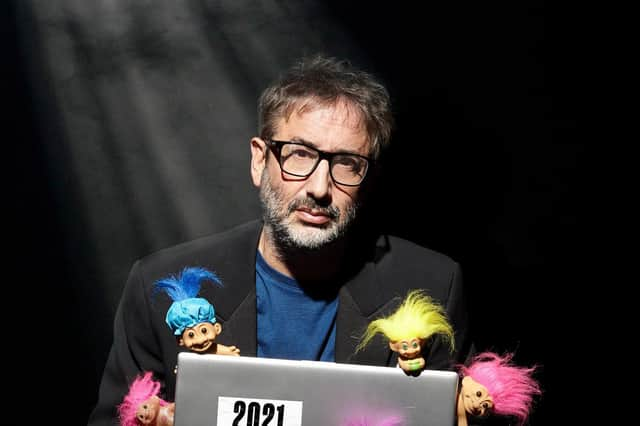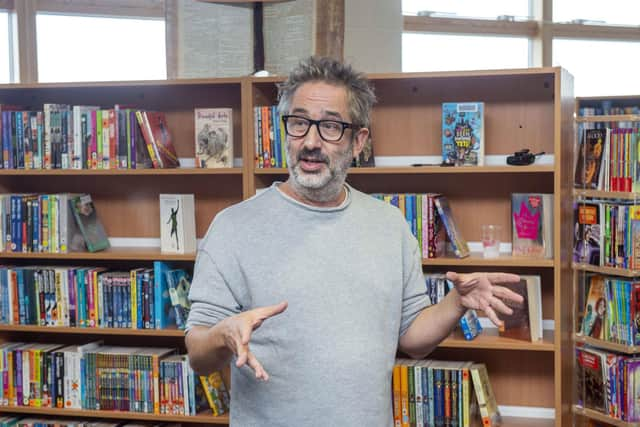David Baddiel on comedy, dealing with fame and taking on the internet trolls


It was only a couple of months old when the pandemic first struck which meant the tour (along with most other things) had to be put on hold.
It finally resumed this year and comes to York and Halifax next week. “It’s a very unusual situation for a comedian, or any kind of performer, because you’ve got this mojo to go out there and do a show and then suddenly you have to put that in suspended animation and try to find it again,” says Baddiel.
Advertisement
Hide AdAdvertisement
Hide AdHis show, as its title suggests, is inspired by social media and was garnering plenty of plaudits before it was paused. “If anything, social media has intensified its grip on our lives over lockdown, so it feels quite relevant,” he says. “The show is really about the way social media has created this extreme landscape where people get very angry and say very bizarre things.”


The conventional wisdom is you shouldn’t engage with extreme views online or internet trolls, but Baddiel does the opposite. “I went against that because I thought this might be right for a lot of people, but for a comedian they’re hecklers and they abuse you anonymously out of the darkness, like a heckler. And the job of a comedian is to not ignore a heckler but to try and make it funny,” he says.
“So in a very simple way the show is about that, can you transform this anger and this hate into comedy? Can you make fun of it, not in a gratuitous way, but can you make it into something fun which takes all the poison out of it? Because nothing undercuts and subverts hatred better than comedy. Comedy is much better than seriousness at doing this.”
Baddiel admits he has a “love/hate” relationship with social media. “I take you into the darkness in the show and show you some of the most horrible things that have been said about me, or that I’ve come across, but I also very much show some of the funniest things.”
Advertisement
Hide AdAdvertisement
Hide AdHe often uses twitter to share jokes with people. “I’m almost like the conductor of this comedy orchestra, because I’ll say something gently funny and someone else will respond to that and build on it, and it can be really beautiful and it can be a place of communion which is what it was meant to be. It was meant to be a place where we all join in and we all share things, instead of it being people at loggerheads with each other.”
Baddiel grew up in a Jewish family in north London and it was his older brother who first turned him on to comedy. “He played me Derek and Clive, and I’d never heard anything so comically liberating because it was so unbelievably obscene. It was like Punk Rock for me in comedy terms.”
At his school he got involved in a lunchtime show done by the sixth formers. “For reasons I can’t remember, I got to write that show. I came to it because it used to be rubbish, full of boring songs about life at that school and I changed it to sketches, mainly about teachers, and it absolutely stormed it.
“It was only on once and got banned, and I nearly got expelled, but suddenly I was cool at the school which I’d never been before and I really enjoyed it. I could feel when I was making fun of the head of music that the boys could all relate to what I was saying, it’s that communion thing that comedy can do, and I kept wanting to do it from then on.”
Advertisement
Hide AdAdvertisement
Hide AdHe went to King’s College, Cambridge, where he read English and was a member of the fabled Footlights club. He then spent time on the comedy circuit before finding fame with The Mary Whitehouse Experience, which featured him and Rob Newman as one double act, and Hugh Dennis and Steve Punt as the other.
“I remember me and Rob turning up at a gig after the first series and I thought there’d be about a hundred people there, and there hundreds and hundreds, with people queuing round the block. And I thought ‘oh I see, it’s happened, we’ve become well known.’ That felt brilliant, it felt brilliant that people would come and see you.”
In 2013, he returned to Stand up with a show called Fame (Not The Musical), which examined the pros and cons of being famous.
“It was brilliant but it was also destructive as fame always is,” he says, referring to the early days. “It was strange there was this cartoon version of me, literally in my case, because Spitting Image did a puppet of me. That’s what you have to deal with and it is destructive, it was quite destructive to me and Rob because we fell out really badly. But it was still brilliant, because it was brilliant to be the first comedians to do Wembley Arena.”
Advertisement
Hide AdAdvertisement
Hide AdHaving been in the business more than 30 years, how does he view comedy today? “There’s definitely a proliferation of comedy and there are more diverse voices in comedy than there was and that’s all very good. And there are lots of brilliant younger comics who’ve come along since me and Rob, but there is a greater monitoring and policing of comedy than there was, because everyone feels they can police their little fiefdom of what might upset them, or what they think should, or shouldn’t, be funny.
“And I think that creates a sort of second guessing around comedy and I don’t think that’s a good thing. I don’t think it’s a good thing that people think ‘oh, before I can be funny I need to think about who might be offended,’” he says
“You can’t make a joke about anything now without people fastening on their preconceptions, and their team, to what you’ve said. And that has to be fought, otherwise no one can say anything funny ever any more.”
As well as being a comedian, Baddiel is also a successful novelist, screenwriter, and children’s author. In 1996, he and Frank Skinner co-wrote the lyrics to Three Lions, the footballing anthem, while his stage show, My Family: Not the Sitcom, was a sellout in the West End.
Advertisement
Hide AdAdvertisement
Hide AdDespite the breadth of his work, he sees himself as a storyteller in essence. “When people say ‘oh you do so many different things,’ I always think it’s really just one thing. It’s not like I’m a comedian and also a plumber, at which I’d be very bad.
"It’s basically telling stories using words in different forms, whether it’s on stage doing a show about trolls, or writing a children’s book, or a football song, or doing a documentary. I’m good at structuring a story and I think I’m good at relating to people. It’s weird that the same skill crops up in different mediums, and I’m lucky to be able to do that.”
David Baddiel’s Trolls: Not The Dolls comes to the Grand Opera House, York, on Monday, and the Victoria Theatre, Halifax, next Weds. For tickets and details visit https://www.davidbaddiel.com/
Comment Guidelines
National World encourages reader discussion on our stories. User feedback, insights and back-and-forth exchanges add a rich layer of context to reporting. Please review our Community Guidelines before commenting.
